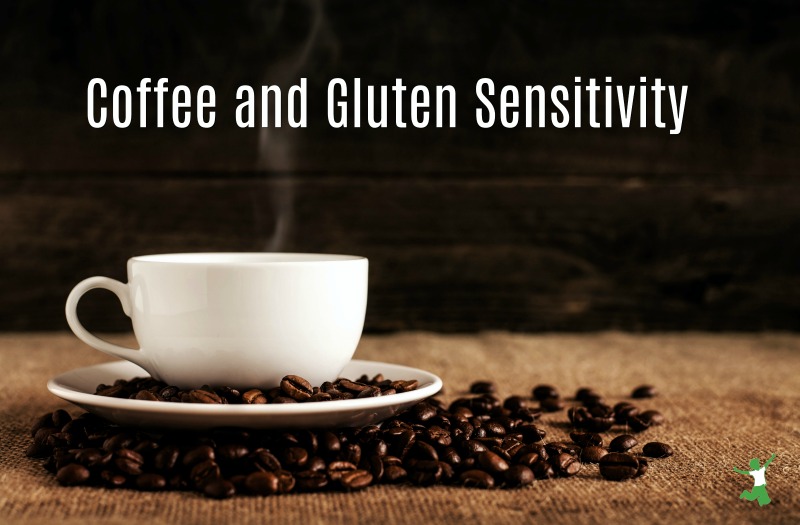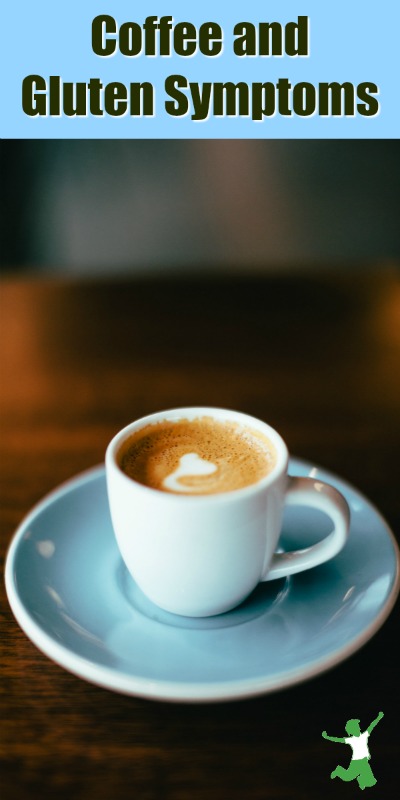Table of Contents[Hide][Show]
Coffee should be avoided by those who are Celiac and many who suffer from wheat sensitivity as it contains cross-reactive proteins to gluten.

If you drink coffee, even bulletproof coffee and have gluten sensitivity or celiac, you might want to sit down for this one.
There is a surprising connection between gluten and coffee that is by and large ignored by the health community. This revelation holds ramifications for other autoimmune disorders as well.
The problem has nothing to do with caffeine, so decaf coffee would be included in this discussion.
In a nutshell, fairly recent lab research has revealed that 10% of coffee is a protein that cross-reacts with gluten antibodies.
This means that if you are gluten sensitive or celiac and are avoiding gluten-containing grains or perhaps have even gone completely grain-free if you still drink coffee there is a strong likelihood that the protein in the coffee is triggering the very same gluten-related health problems you are trying to avoid.
In other words, even if you think you are doing fine with your current gluten-free diet, it is very possible that skipping the coffee could take your health to the next level.
Symptoms of Gluten Sensitivity
Most people who are gluten sensitive don’t realize it because gastrointestinal problems like burping, gas, tummy upset, or toilet issues are the least common way for gluten issues to present themselves!
The most common symptoms of gluten sensitivity?
Migraines and other neurological issues – even MS!
Hormone and endocrine problems are another common way for gluten issues to manifest themselves.
How Coffee Triggers Gluten Sensitivity
So what exactly happens when a gluten sensitive person eats gluten?
Folks with gluten antibodies react to any gluten in the diet by mounting an immune response. This means that gluten is perceived by the body as an invader and the gluten antibodies attack the gluten itself trying to destroy it. This gluten attack is an inflammatory response and inflammation issues can occur anywhere in the body in any tissue or organ.
Here’s the real shocker I came across when researching the coffee/gluten connection:
According to Dr. David Clark DC, functional neurologist and endocrinologist:
There’s not a disease or health condition you can think of that does not have an association – in the research literature – with gluten sensitivity.
That’s a very strong statement!
In essence then, if you are gluten sensitive in any way shape or form, and it seems that most people are whether they know it or not given the epidemic levels of autoimmune issues today, gluten antibodies have the potential to react to proteins in other foods as if they are gluten thereby triggering an immune and inflammatory response.
The protein in coffee is the most common cross-reactor for gluten. Because it is the protein in the coffee that is the trigger, switching to decaf coffee does not solve the problem. Apparently, instant coffee is the worst offender.
Is it possible to be gluten sensitive and not cross-react to coffee? Yes, it’s possible but you’ll have to do some expensive lab testing with a knowledgeable doctor to find out.

Reference
Journal of Food and Nutrition Sciences
More Information
You Probably Need to Change WHEN You Drink Coffee
Coffee Enema
Morning Coffee Fix
Caffeine and Chronic Back Pain
Healthy Coffee Substitutes








I had tests showing gluten & dairy allergies. Therefore my coffee is black.
However I always feel terrible after drinking it. Dehydrated, sore joints, dizzy, confused, insomnia, unhappy gut….and basically feeling stressed/jittery. The good feeling at the time of drinking it lasts 10 minutes before the nasty symptoms kick in.
Probably the strangest symptom is fluid retention, especially under my eyes (kidney/adrenal zone, go figure!).
I’m grateful for this blog post. It makes a lt of sense to me. I think research in future will confirm all of this.
By the way – my relative is Celiac, he gets the runs after coffee. Now we know why.
Finally, I just wanted to say that education doesn’t install fear. Knowledge is empowerment. Yes, more research on this is needed. However Chinese herbs worked & weren’t researched for hundreds of years. Many still haven’t been! Peer reviewed lit is not the be all & end all.
I worked at a seminar by Apex Energetics this weekend on Neurotransmitters and Brain. Part of the discussion focused on gluten and its affect on the brain for those that are gluten sensitive. The speaker at this event works closely with Dr. Vojdani from Cyrex Labs. He explained that the coffee tested for in the cross reactive panel is INSTANT COFFEE like Folgers. The speaker explained that Dr. Vojdani also tested gourmet coffees like Starbucks and there were NO cross reactivity issues with these coffees. You may want to update this article given this information.
I reacted to Starbucks coffee!
Does tea count too?
Great website!
But for the link between coffee and gluten, I am a bit annoyed with the science behind this study.
Dr.Clark and Dr. Vodjani mention recent medical studies (I presume in April 2012) but unfortunately there is no medical study published in any scientific journal (at least in October 2012) on a direct link between gluten and coffee. You can easily check in PubMed with the keywords ‘Gluten’ and ‘Coffee’ at http://www.ncbi.nlm.nih.gov/pubmed
There is an article in 1983 indicating that coffee contains peptides that can bind to opioid receptors. Gluten peptides can also bind to opioid receptors. This common point does not suggest that the peptides in the coffee can trigger the same reaction that those in gluten. Many different opioid receptors exist and thus the peptides in coffee and gluten could be very different.
Besides, revealing results from medical studies before publication is usually a bad idea. Once the data is reviewed by other experts in the field, it can be discovered that it was not reliable. It can be very suspicious to talk about data that have never been scientifically checked.
That being said I am gluten sensitive and I feel that some coffees are not acting very well on my intestines. Since I observe similar effects with other drinks with high content with caffeine such as energy drinks, I suppose that it could be due to caffeine. But I do not exclude the possibility that these doctors may be right. They just have to seriously prove it.
My advice is to try to stop coffee for a few weeks and see if there is any improvement on the intestinal health. Another advice if you decide to stop coffee: stop progressively or you may experience bad withdrawal effects such as headaches. Black tea first and then green tea seems to me a good way to go through the transition more smoothly.
I would really appreciate it if you could cite the scientific research studies supporting “10% of coffee is a protein that cross reacts with gluten antibodies.”
Chiropractor David C. Clark is not enough.
Thank you.
S
very interesting
PSALM 104:14,15″….”and bread which strengtheneth man’s heart.”
Blah,blah,blah!!!!!Gluten is actually a splendid complex vegetable protein,which could be transformed to become easily digestible,nutritiuos and delicious via ancient culinary practices which stimulate the innate enzyme activity,as well as neutralize naturally occurring,unwanted anti-nutrients.FERMENTATION,GUYS, THE SLOOOOOOOW KITCHEN!!! K U D O S, S A N D O R E L L I X K A T Z!
and what about tea? at least, tea leaves are not beans…